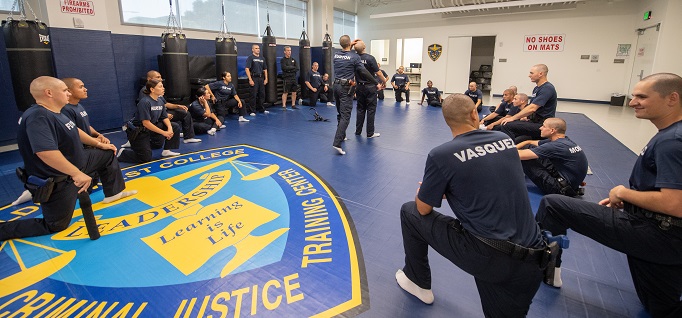Training those who serve and protect
By Ed Finkel
July 16, 2019
A California community college fills a critical need with its police training program.
Police training programs at community colleges are a vital cog in ensuring that local law enforcement agencies have a steady supply of recruits who have not only the weapons training, legal knowledge and other traditional skills but also professional skills like critical thinking in an age when police behavior has come under scrutiny.
“We’re doing a significant service to the community. Demand is high,” says Ron Lowenberg, dean of criminal justice at Golden West College in Huntington Beach, California. But demands are high, too, thanks to issues like allegations of inappropriate use of force, or the challenges of dealing with the homeless population, he says. “We as a training institution have to be nimble and flexible enough that as societal issues change.”
Maintaining relevance
Many recruits at Golden West’s Regional Criminal Justice Training Center arrive already hired by law enforcement agencies, Lowenberg says. Those who sponsor themselves and/or with support of family—an increasing number of whom are military veterans—are usually hired quickly, he says. The regular course of study takes place over six months and 1,000 hours, he adds.
The state Commission on Peace Officer Standards and Training mandates statewide standards for issues like basic training and in-service, as well as agency responsibilities when it comes to hiring police officers, which programs like Golden West follow, Lowenberg says. The state’s standards can get pretty specific. For example, the academy requires recruits to master an obstacle course that, among many other tests, involves dragging a dummy a certain distance.
“It’s to replicate a situation like dragging a fallen partner out of a building,” he says. “For as long as I can remember, the dummy was required to be 168 pounds. We recently got a post saying it had to be 172 pounds because people’s weight is going up. No kidding.”
The center “stays in touch with the profession” through its executive advisory board composed of local police chiefs, to make sure training remains relevant to the day-to-day work of policing. Among the changes Lowenberg has noticed over the past decade or two that curricula have needed to address have been the rise in community policing techniques, knowledge of issues like mental health and crisis intervention, and active shooter incidents in schools and other locations. “It was cops and robbers, and responding to services,” he says. “It’s just gotten increasingly more complicated.”
In addition to the basic course of study, Golden West this fall will offer a Specialized Investigator’s program for limited-duty peace officers, mostly at county and state agencies who have the power to investigate particular crimes. They will need four months of instruction instead of six because they won’t requires training for duties like wielding a rifle or stopping a motorist. “Their training is around criminal law, how do you investigate, case management and those kinds of things,” Lowenberg says.
This is an excerpt from a longer article to appear in the August/September Community College Journal. Look for it in your mailboxes in mid-August.



